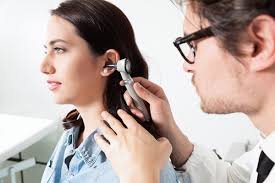Maintaining ear health is crucial for preserving your hearing and overall well-being. While there are many home remedies and over-the-counter solutions for ear care, there are times when professional intervention is necessary. This article highlights the importance of seeking professional help for ear cleaning and hearing tests, outlining when and why it’s essential to consult an expert.
Why You Should See a Professional for Ear Cleaning
Earwax (cerumen) serves important functions, such as protecting the ear canal and preventing infections. However, excessive or impacted earwax can lead to various issues. Here’s why seeing a professional for ear cleaning is important:
- Safe Removal: Professionals use specialized tools and techniques to remove earwax safely. This reduces the risk of injury, infection, or pushing wax further into the ear canal, which can cause damage to the eardrum.
- Diagnosis of Underlying Issues: An audiologist or ENT specialist can identify and address any underlying conditions contributing to earwax buildup, such as infections, skin conditions, or anatomical abnormalities.
- Prevention of Complications: Improper ear cleaning at home can lead to complications, such as ear infections, perforated eardrums, or exacerbation of existing hearing issues. Professional cleaning minimizes these risks.
- Expert Advice: A professional can provide guidance on maintaining ear health and preventing future wax buildup. They can also recommend appropriate ear care products and practices.
When to Seek Professional Ear Cleaning
You should consult a healthcare professional for ear cleaning if you experience:
- Persistent Ear Pain or Discomfort: If you have ongoing pain or a sensation of fullness in the ear, a professional can determine the cause and provide relief.
- Hearing Loss: A sudden or gradual decrease in hearing ability may be due to earwax buildup or other issues that require professional evaluation.
- Tinnitus: Ringing or buzzing in the ears that does not go away should be assessed by a specialist to rule out earwax impaction or other underlying conditions.
- Suspected Infection: If you notice discharge, odor, or redness in the ear, seek professional help to address potential infections and receive appropriate treatment.
Importance of Hearing Tests
Regular hearing tests are vital for detecting hearing loss early and managing it effectively. Here’s why they are important:
- Early Detection of Hearing Loss: Hearing loss can develop gradually, making it hard to notice changes. Regular hearing tests can identify early signs of hearing loss, allowing for timely intervention and treatment.
- Customized Solutions: Hearing tests provide detailed information about your hearing abilities, which helps audiologists recommend personalized solutions, such as hearing aids or other assistive devices.
- Monitoring Changes: Regular hearing evaluations help monitor changes in your hearing over time, ensuring that any new issues are addressed promptly and that your hearing aids or other devices are adjusted as needed.
- Overall Health Assessment: Hearing tests can also reveal other health issues, such as neurological conditions or the impact of chronic diseases on hearing. Early detection of these issues can lead to better overall health management.
How Hearing Tests Are Conducted
Hearing tests typically involve the following steps:
- Initial Consultation: You will discuss your hearing history, any concerns, and your lifestyle with the audiologist. This helps them understand your needs and potential hearing issues.
- Physical Examination: The audiologist will examine your ears for signs of earwax buildup, infections, or other abnormalities that could affect your hearing.
- Hearing Assessment: A series of tests, including pure-tone audiometry, speech testing, and possibly tympanometry, will be conducted to assess your hearing ability and identify any hearing loss.
- Results and Recommendations: The results of the hearing tests will be explained to you. If hearing loss is detected, the audiologist will discuss treatment options, such as hearing aids or other interventions.
Tips for Maintaining Ear Health
In addition to seeking professional care, consider these tips for maintaining healthy ears:
- Avoid Inserting Objects: Never use cotton swabs or other objects to clean inside the ear canal. This can push wax deeper and cause damage.
- Protect Your Ears from Loud Noises: Use ear protection in noisy environments to prevent noise-induced hearing loss.
- Keep Ears Dry: Moisture can lead to ear infections and wax buildup. Dry your ears gently after swimming or bathing.
- Schedule Regular Checkups: Regular visits to an audiologist or ENT specialist can help monitor your ear health and detect issues early.
Conclusion
Seeing a professional for ear cleaning and hearing tests is essential for maintaining good ear health and preventing potential issues. Professionals provide safe and effective solutions for earwax removal, early detection of hearing loss, and personalized treatment recommendations. By prioritizing professional care, you can ensure optimal ear health and preserve your hearing for the long term.




